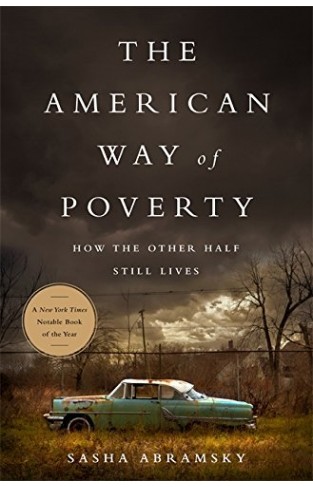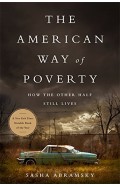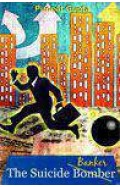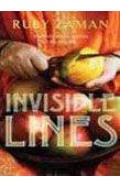- Home
- Urdu Books
- Children's Urdu Books
- Business & Management
- The American Way of Poverty: How the Other Half Still Lives
The American Way of Poverty: How the Other Half Still Lives
By: Sasha Abramsky
-
Rs 932.25
- Rs 1,695.00
- 45%
You save Rs 762.75.
Due to constant currency fluctuation, prices are subject to change with or without notice.
A New York Times Notable Book of the YearFifty years after Michael Harrington published his ground-breaking book The Other America , in which he chronicled the lives of people excluded from the Age of Affluence, poverty in America is back with a vengeance. It is made up of both the long-term chronically poor and new working poor,the tens of millions of victims of a broken economy and an ever more dysfunctional political system. In many ways, for the majority of Americans, financial insecurity has become the new norm. The American Way of Poverty shines a light on this travesty. Sasha Abramsky brings the effects of economic inequality out of the shadows and, ultimately, suggests ways for moving toward a fairer and more equitable social contract. Exploring everything from housing policy to wage protections and affordable higher education, Abramsky lays out a panoramic blueprint for a reinvigorated political process that, in turn, will pave the way for a renewed War on Poverty.It is, Harrington believed, a moral outrage that in a country as wealthy as America, so many people could be so poor. Written in the wake of the 2008 financial collapse, in an era of grotesque economic extremes, The American Way of Poverty brings that same powerful indignation to the topic.
A New York Times Notable Book of the YearFifty years after Michael Harrington published his ground-breaking book The Other America , in which he chronicled the lives of people excluded from the Age of Affluence, poverty in America is back with a vengeance. It is made up of both the long-term chronically poor and new working poor,the tens of millions of victims of a broken economy and an ever more dysfunctional political system. In many ways, for the majority of Americans, financial insecurity has become the new norm. The American Way of Poverty shines a light on this travesty. Sasha Abramsky brings the effects of economic inequality out of the shadows and, ultimately, suggests ways for moving toward a fairer and more equitable social contract. Exploring everything from housing policy to wage protections and affordable higher education, Abramsky lays out a panoramic blueprint for a reinvigorated political process that, in turn, will pave the way for a renewed War on Poverty.It is, Harrington believed, a moral outrage that in a country as wealthy as America, so many people could be so poor. Written in the wake of the 2008 financial collapse, in an era of grotesque economic extremes, The American Way of Poverty brings that same powerful indignation to the topic.
The American Way of Poverty: How the Other Half Still Lives
By: Sasha Abramsky
Rs 932.25 Rs 1,695.00 Ex Tax :Rs 932.25
Zubin Mehta: A Musical Journey (An Authorized Biography)
By: VOID - Bakhtiar K. Dadabhoy
Rs 472.50 Rs 1,050.00 Ex Tax :Rs 472.50
Manning Up: How the Rise of Women Has Turned Men into Boys
By: Kay Hymowitz
Rs 646.75 Rs 995.00 Ex Tax :Rs 646.75
No similar books from this author available at the moment.
No recently viewed books available at the moment.
Zubin Mehta: A Musical Journey (An Authorized Biography)
By: VOID - Bakhtiar K. Dadabhoy
Rs 472.50 Rs 1,050.00 Ex Tax :Rs 472.50
The American Way of Poverty: How the Other Half Still Lives
By: Sasha Abramsky
Rs 932.25 Rs 1,695.00 Ex Tax :Rs 932.25













-120x187.jpg?q6)













